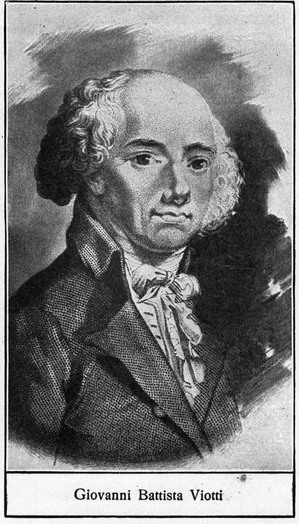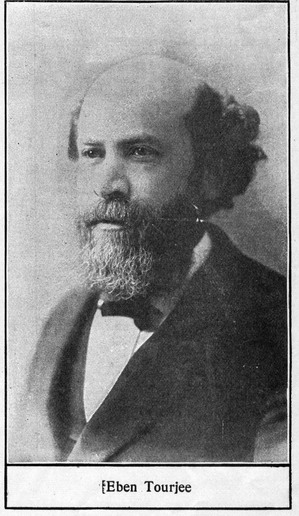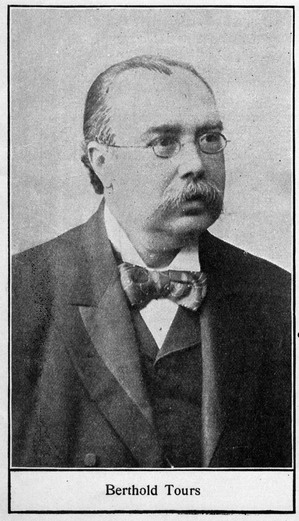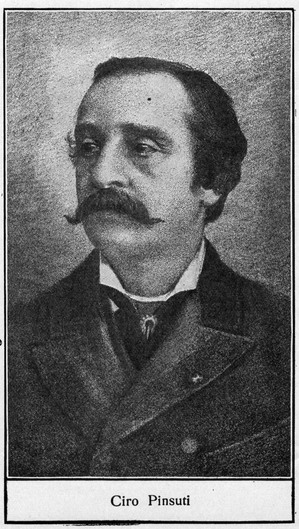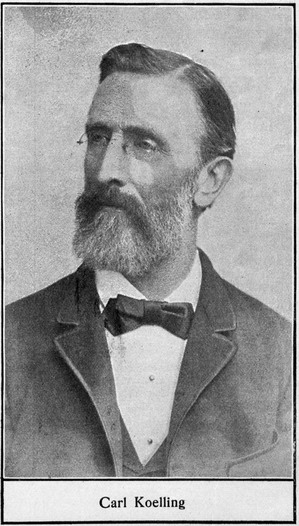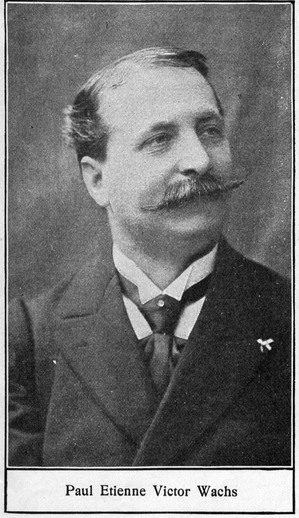 PAUL ETIENNE VICTOR WACHS.
PAUL ETIENNE VICTOR WACHS.
(Vahks)
Wachs was born at Paris, Sept. 19, 1851. He studied at the Paris Conservatory, where he was a pupil of César Franck, Duprato, and Victor Massé. He showed particular talent as an organist, and in 1877 secured the first prize for organ playing. After his student days were over he became “organiste accompagnateur” at the famous church of St. Sulpice, and then organist of the Church of St. Méry—a post held formerly by Saint-Saëns, Chauvet and Tissot. He became an Officer of the French Academy in 1900, and was appointed an Officer of Public Instruction in 1908. He has composed works for the orchestra, organ, piano and violin, and has earned an international reputation. Wachs has also published works on Harmony, Counterpoint, Plain-Song, and Improvization. Nevertheless, he is best known by his many excellent salon pieces for the piano. These include Necklace of Gems, Rosy Fingers, The Song of the Fathers, and the famous Shower of Stars. His best known organ pieces are, perhaps, Pastorale, and Hosanna. Wachs has melodic gifts of a very high order, and his works all have clever harmonic background. These works also have the merit of being extremely “playable”, and it is evident that the composer possesses a unique knowledge of the piano keyboard and its possibilities.
Viotti was born at Fontaneto da Po, Vercelli, Italy, May 23, 1753, and died in London, Mar. 3, 1824. His gifts as a self-taught violinist earned him the patronage of the Prince of Cisterna, to whose residence in Turin he went in 1766. The Prince sent him to study with Pugnani, and, according to Viotti’s own statement, paid for “an education that cost twenty thousand francs before it was completed.” He then went on tour to A Switzerland, Russia, Germany and France. He intended to remain in Paris only a few months, but remained there ten years, and was acclaimed the greatest living violinist by his many admirers. Owing, some say, to jealousy, he gave up violin playing to become manager of Italian opera. The Revolutionary troubles, however, forced him to retire to London, where he achieved further success, and gained the friendship of Mr. and Mrs. Chinnery, who befriended him through his later misfortunes. He was wrongly accused of taking part in a revolutionary correspondence, and was obliged to leave England in 1798, and took refuge on the continent. He returned to London in 1801 and established himself as a wine merchant, in which, however, he was woefully unsuccessful. Viotti settled in Paris and from 1819 to 1822 he was director of the Opera. He returned eventually to London, where he died in great poverty at the house of the Chinnerys. He was undoubtedly the greatest classical violin player of his day. His pupils included Pixis Baillot and Rode.
Tourgée was born at Warwick, R. I., June 1, 1834, and died in Boston, Apr. 12, 1891. He was the son of parents in humble circumstances and was obliged to work for his living at the age of eight. He managed to teach himself music, however, and at the age of fifteen became a clerk in a music store in Providence. Two years later he opened a store of his own in Fall River, and also taught music in public school. It was here that he first established the class system of teaching piano, voice and organ which has since become so popular in the United States. In 1859 he founded a conservatory in East Greenwich, and still further developed his ideas in class teaching. A trip to Europe in 1863 enabled him to study piano with various distinguished teachers, including August Haupt. He also made a careful study of the European conservatory system. Upon his return he founded a conservatory in Providence, and in 1867 extended his operations to Boston, where he founded the New England Conservatory. He soon drew around him a distinguished body of teachers and placed a sound musical education within reach of all. He took an active part in the great “Peace Jubilee” of 1869, and much of its musical success was due to his enterprise and energy. Ebon Tourjée must be counted among the great promoters of musical education in America. He is a startling example of how zeal and enthusiasm, and a talent for organization will overcome a lack of fundamental education.
Tours was born Dec. 17, 1838, at Rotterdam, and died in London, March 11, 1897. His father was an organist of some note and gave him his first instruction, which was afterwards supplemented by study with Verhulst. He afterwards studied at the conservatories of Leipzig and Brussels, and went for two years with Prince George Galitzen to Russia. He went to London in 1861, and occupied himself in writing, teaching and playing the violin in various good orchestras. He became musical adviser to the well-known music publishing firm of Novello, Ewer & Co., in 1878. This resulted in his making arrangements from many important orchestral scores such as Mendelssohn’s Elijah, Gounod’s Redemption and Beethoven’s Mass in C. He also wrote a Primer for the Violin. Tours is best known, however, by his admirable songs, hymn tunes and Services for the Episcopal Church. Among these may be mentioned the well-known Service in F, the Easter anthem, God Hath Appointed a Day, and the popular Pillars of the Earth are the Lord’s. His songs, Because of Thee, The New Kingdom, Far from My Heavenly Home and The Gate of Heaven have also won considerable favor. He also wrote piano pieces which have found a place in the repertoire of many piano students. Berthold Tours was a musician whose ripe scholarship found a favorable channel in his work as music editor.
Pinsuti was born at Sinalunga, Siena, Italy, May 9, 1829, and died in Florence, Mar. 10, 1888. He was given some instruction by his father, and at the age of eleven appeared in Rome with such success that he was elected an honorary member of the Accademia Filarmonica. He was taken to England by Henry Drummond, M.P., in whose house he lived while receiving instruction from Cipriani Potter (piano) and H. Blagrove (violin). He returned to Italy in 1845 and became a pupil at the Conservatory of Bologna, where he also received private instruction from Rossini. Pinsuti went back to England in 1848 and became a teacher of singing in London and Newcastle. From 1856 he was professor of singing at the Royal Academy of Music in London, and in addition to his many pupils he also gave extra instructive assistance to many eminent artists including Grisi, Bosio, Patti, and Mario. As a composer he wrote several operas that were produced with moderate success in Italy, but is best known by his many songs and part-songs. Such songs as The Bedouin Love Song, The Arrow and the Song, Lead, Kindly Light, and I Will Give You Rest have won great popularity both in England and in this country. No less popular are the part-songs, Good Night, Beloved, The Sea Hath its Pearls, and Spring Song. He had a great melodic gift and these compositions are likely to retain a strong hold on the popular musical imagination for many years to come.
Koelling was born in Hamburg, Feb. 28, 1831. He was the son of an excellent flute player, and took to music early in life. He became a pupil of J. Schmitt, and appeared in public at the age of eleven. He met with the favor of the reigning sovereign of Bűckeburg, a blind man, who became much interested in the boy, and offered to defray the expenses of his education. The boy’s mother was obliged to refuse the offer as she needed his assistance. Upon returning to Hamburg he again went to Schmitt for instruction and also to Marksen, the teacher of Brahms. He became leader of the band of the Eighth Battalion of the army, stationed at Hamburg, and also leader of many singing societies, several of which he founded. In 1878 he came to Chicago where he has remained ever since, teaching and composing. He has been one of the most prolific of writers, and his works include many well-known piano pieces. The opera, Schmetterlinge, was produced in Hamburg in 1891, and other works in the larger forms have also obtained a hearing. Most of his compositions, however, have been teaching pieces, in providing which he has been a “good angel” to many a student plodding along the road of technical efficiency. Among these pieces may be mentioned Hungary, Two Flowers, Eight-Measure Studies in all Keys, Teacher and Pupil Duets, From Norway, Flying Leaves, Chasse Infernale, and many others.


